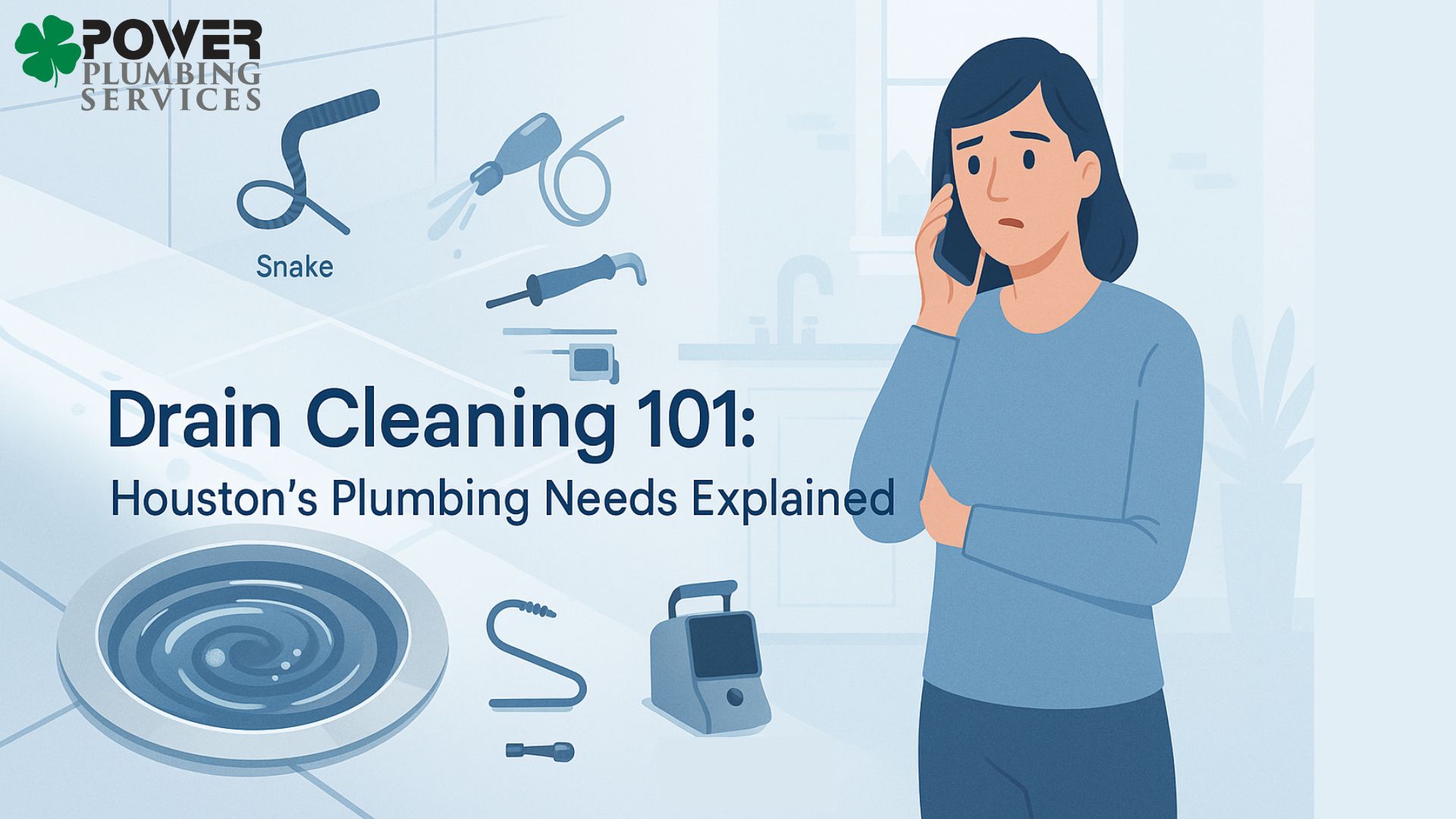Drain cleaning is a preventive plumbing service that removes buildup and debris from your pipes to keep wastewater flowing smoothly and prevent costly plumbing emergencies. For homeowners in Houston, where high humidity, clay soil, and frequent rainfall increase the risk of root intrusion and stormwater backup, keeping drains clear is essential to protect both your plumbing system and your home’s hygiene.
Neglected drains can lead to foul odors, standing water, slow drainage, and even sewage backflow. These issues often stem from accumulated grease, food particles, soap scum, and invasive tree roots that clog your drainpipes over time. Licensed plumbers use specialized tools—such as drain snakes, inspection cameras, and hydro-jetting systems—to identify and remove these obstructions safely and effectively.
In this guide, you’ll learn what drain cleaning is, how to recognize early signs of a clog, which cleaning methods plumbers use, how much it typically costs in Houston, and how to choose a trusted local plumbing company.
What Is Drain Cleaning?
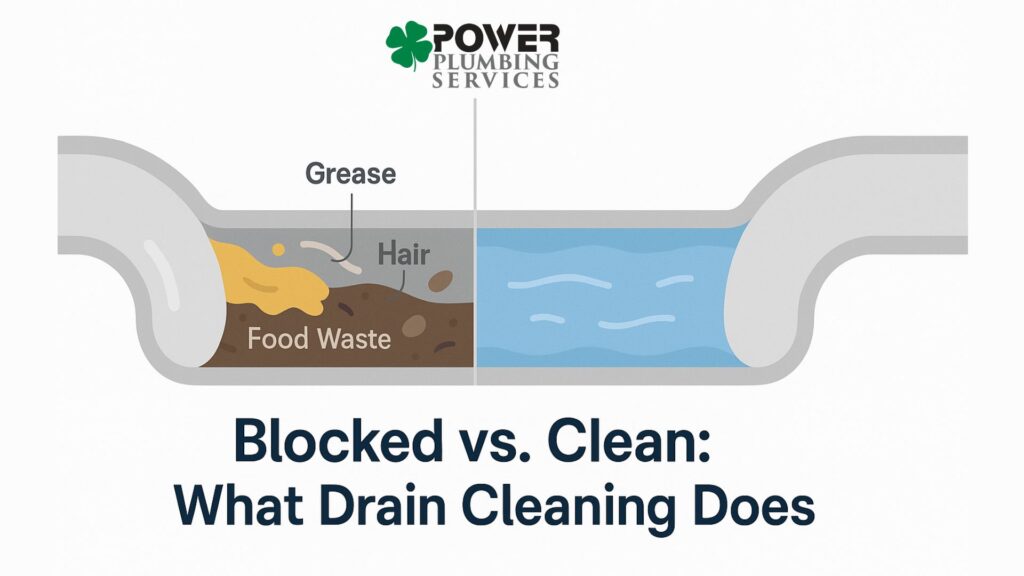
Drain cleaning is the process of removing blockages, buildup, and debris from your plumbing system to restore proper drainage and prevent wastewater from backing up into your home. Obstructions commonly include grease, hair, food waste, soap residue, and tree roots. When these materials accumulate inside your pipes, they reduce water flow and create pressure that can eventually lead to pipe damage or flooding.
Routine drain cleaning is part of preventive plumbing maintenance. It typically involves scheduled service to remove buildup before it causes noticeable issues. In contrast, emergency drain cleaning addresses sudden and severe clogs that require immediate attention—often due to foreign objects lodged in the line or complete blockage of a main drain.
By scheduling routine drain cleaning, especially in homes with older plumbing or heavy kitchen use, homeowners can prevent issues before they start and maintain a sanitary, code-compliant plumbing system.
Why Is Regular Drain Cleaning Important?
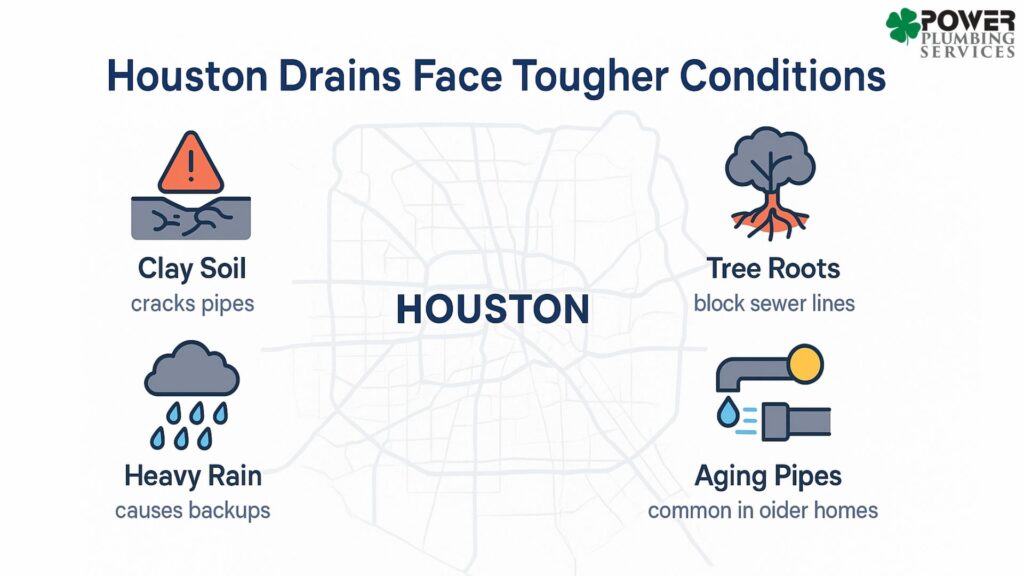
Regular drain cleaning is critical for Houston homeowners due to a combination of environmental and structural factors that accelerate drain clogs and pipe deterioration. Houston’s high humidity encourages biofilm and bacterial growth inside pipes, while heavy rainfall and storm runoff can overwhelm older drainage systems. Many residential neighborhoods also have mature trees with root systems that invade underground sewer lines, increasing the risk of severe blockages.
Homes built on clay soil are particularly vulnerable. As the ground shifts, it can place pressure on aging clay or cast iron drain lines, causing small cracks where debris and roots enter. Over time, these intrusions reduce drainage capacity and increase the chance of wastewater backup into the home.
Routine cleaning helps maintain drain health by preventing buildup that leads to corrosion, backflow, and foul odors. It also extends the life of the plumbing system and reduces the need for emergency repairs. Keeping drains clear ensures compliance with plumbing codes and promotes a hygienic living environment, especially in high-use areas like kitchens and bathrooms. For Houston residents, proactive maintenance means cleaner water flow, fewer disruptions, and long-term cost savings.
What Are the Signs You Need Drain Cleaning?
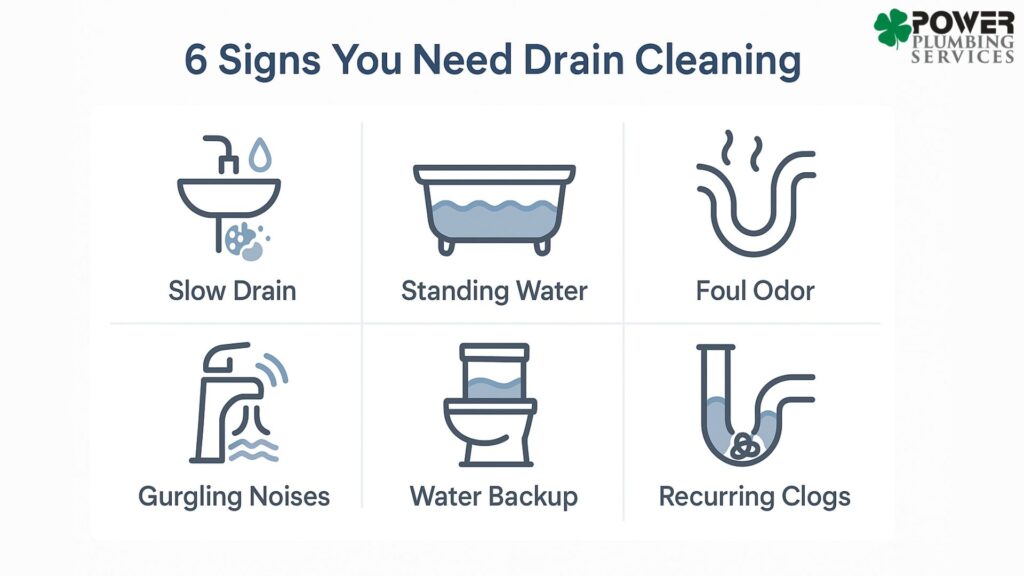
Several early warning signs suggest it’s time to schedule professional drain cleaning. The most common symptom is a slow-draining sink, tub, or shower, often caused by gradual buildup of hair, grease, or food debris inside the pipe.
Common signs include:
- Slow-draining sinks or tubs – Water takes longer than normal to drain after use, often caused by grease or hair buildup.
- Standing water – Pools of water remain in the sink or shower, indicating a blockage below the fixture.
- Foul odors – Bad smells from kitchen or bathroom drains may signal decomposing organic matter inside the pipes.
- Gurgling or bubbling sounds – Noises from drains when other fixtures are in use often point to vent stack or sewer line issues.
- Water backing up into other fixtures – Water rising in the tub when you flush a toilet, or bubbling in the sink when the dishwasher runs, usually indicates a main line blockage.
- Recurring clogs – Frequent blockages in the same fixture signal deeper issues beyond surface-level buildup.
In more severe cases, wastewater may back up from one fixture to another—for example, water rising in a shower when the toilet is flushed. This points to a deeper obstruction, often in the main sewer line. Left untreated, these issues can result in widespread drain failure and property damage.
Recognizing these symptoms early allows Houston homeowners to take action before minor clogs escalate into expensive emergencies.
What Methods Do Plumbers Use to Clean Drains?
Professional plumbers use several drain cleaning methods depending on the type of clog, its severity, and the condition of the pipes. Before selecting a method, most licensed plumbers start with a visual inspection or a sewer camera scope to locate the blockage, evaluate the pipe material, and choose the safest and most effective technique.
Drain snaking (also called mechanical augering) is commonly used for minor clogs near sinks or tubs. It’s effective for clearing soft materials like food particles, soap scum, or hair. For tougher or deeper blockages—such as grease buildup, scale deposits, or tree root intrusion—hydro-jetting is the preferred solution. This high-pressure water technique thoroughly scrubs the inside of the pipe and restores full flow capacity.
Each method requires proper training and experience. Incorrect tool use or mismatched techniques can damage older pipes or fail to clear the blockage entirely. That’s why Houston homeowners should always rely on licensed professionals who can match the right tool to the specific issue.
How Does Drain Snaking Work?
Drain snaking uses a flexible steel cable with a rotating tip—called a drain auger—to physically break through or retrieve clogs inside the pipe. The cable is manually or mechanically fed into the drain until it reaches the blockage. Then the plumber rotates the cable to either bore through the obstruction or hook and pull it out.
This method is best suited for small, localized clogs caused by:
- Hair buildup in bathroom drains
- Food particles or grease residue in kitchen sinks
- Soap scum in shower drains
However, drain snaking has limitations. It’s not ideal for heavy grease accumulation, hardened scale, or root intrusion, as it only creates a hole through the blockage rather than fully clearing the pipe walls. For recurring or deeper issues, plumbers typically recommend hydro-jetting instead.
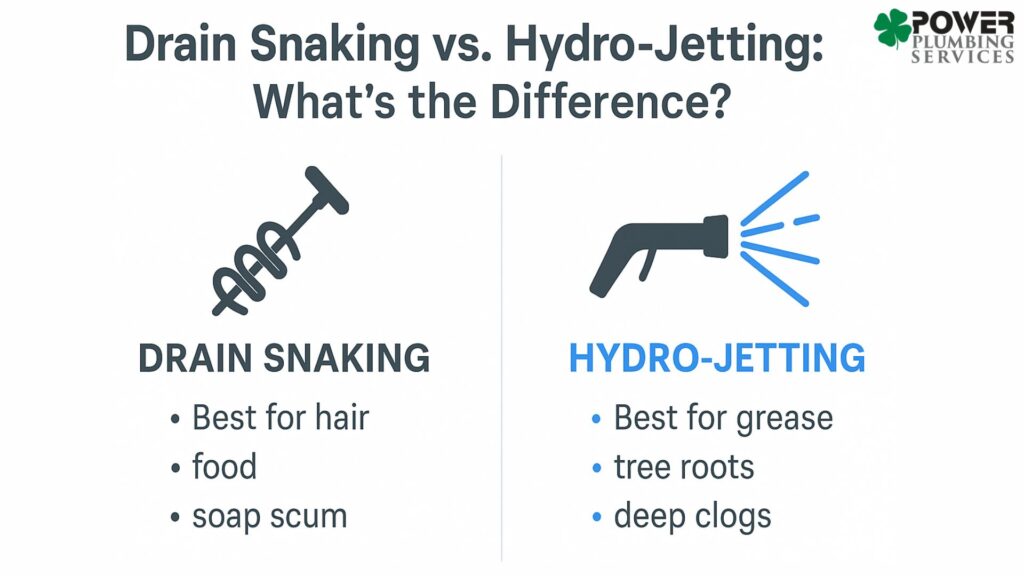
What Is Hydro-Jetting?
Hydro-jetting is a powerful drain cleaning technique that uses high-pressure water—typically between 1,500 and 4,000 PSI—to blast away stubborn clogs and buildup inside the pipe. The system features a specialized nozzle attached to a flexible hose, which sprays water in all directions as it moves through the pipe, thoroughly scouring the interior.
Hydro-jetting is ideal for:
- Cutting through hardened grease and sludge
- Removing tree root intrusion in sewer lines
- Clearing mineral scale from older plumbing systems
- Flushing long pipe sections where buildup accumulates over time
While extremely effective, hydro-jetting should only be performed after a video inspection to ensure the pipe isn’t brittle or damaged. In older homes with clay or corroded cast iron pipes, high-pressure water could cause cracking or collapse. A licensed plumber will adjust pressure settings and nozzle types to match your specific pipe material and blockage severity.
Are Chemical Drain Cleaners Safe?
Chemical drain cleaners are generally not safe for repeated use and should be considered a last resort for minor clogs. Most store-bought products contain caustic compounds such as sodium hydroxide (lye) or sulfuric acid, which generate heat to dissolve organic matter. While these cleaners can offer a temporary fix for slow drains, they also pose serious risks to your plumbing system.
PVC pipes can warp or crack under extreme chemical heat, and older metal pipes—especially galvanized or cast iron—may corrode over time with repeated exposure. In addition to pipe damage, chemical cleaners can be hazardous to handle, releasing fumes that irritate the eyes and respiratory system.
These products are rarely effective against deeper or solid blockages such as grease buildup, tree roots, or collapsed lines. If used at all, they should only be applied to isolated, superficial clogs with no standing water and with strict attention to label instructions.
Safer alternatives include:
- Enzyme-based cleaners – These use natural bacteria to digest organic material slowly and safely.
- Hot water and vinegar – A simple at-home flush that can help loosen minor buildup without damaging pipes.
For stubborn or recurring clogs, it’s always safer and more effective to rely on mechanical methods like snaking or hydro-jetting performed by a licensed plumber.
DIY vs. Professional Drain Cleaning: Which Is Better?
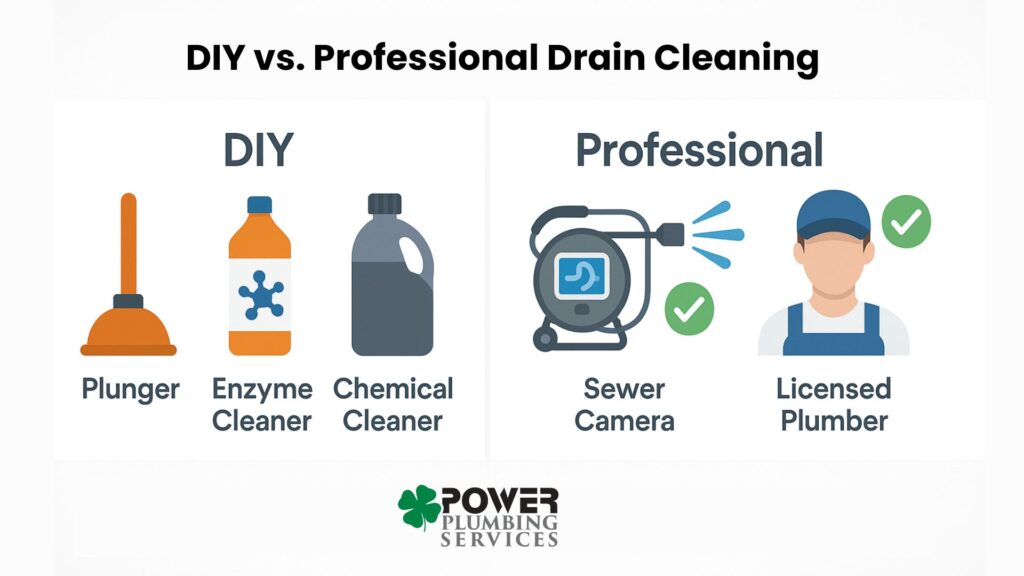
DIY drain cleaning may work for minor surface-level clogs, but it comes with limitations that can make it ineffective—or even risky—for deeper or recurring issues. Homeowners often use plungers, handheld augers, or liquid drain cleaners to clear slow-draining sinks or tubs. These tools can provide temporary relief but often fail to address the full blockage or its root cause.
One major risk of DIY is misdiagnosis. Without the ability to inspect the inside of your drain lines, it’s easy to treat symptoms while missing underlying problems such as a mainline clog, vent stack issue, or pipe damage. Misusing tools or chemicals can also worsen the issue, lead to pipe damage, or cause injury.
In contrast, professional plumbers use drain cameras, hydro-jetting systems, and motorized augers to accurately diagnose and remove clogs without damaging your pipes. They also evaluate pipe condition, material type, and blockage location before selecting the safest method—something DIY approaches can’t replicate.
While DIY methods can save money upfront, they often lead to more expensive repairs if the problem isn’t fully resolved. For slow drains that persist, multiple clogged fixtures, or repeated backups, professional drain cleaning is the safer, longer-lasting solution.
How Much Does Drain Cleaning Typically Cost in Houston?
The average cost for residential drain cleaning in Houston ranges from $150 to $500, depending on the method used, the severity of the clog, and the type of plumbing in your home. Basic services like snaking a kitchen or bathroom sink tend to fall on the lower end of the range, while more complex procedures—such as hydro-jetting or clearing a main sewer line—can raise the price significantly.
Several factors influence drain cleaning costs:
- Cleaning Method: Snaking is typically less expensive than hydro-jetting, which requires more specialized equipment.
- Clog Severity & Location: Deeper clogs or full main line blockages take more time and labor to clear.
- Fixture Accessibility: Hard-to-reach drains in crawlspaces or behind walls may increase labor charges.
- Pipe Type: Older cast iron or clay pipes may require extra care during cleaning, while modern PVC or copper lines are easier to service.
- Additional Services: Camera inspections, emergency visits, or servicing multiple clogged fixtures will increase the total cost.
Some companies offer bundled services that include inspection, cleaning, and a follow-up evaluation. To avoid surprises, always request a written estimate that outlines the cleaning method, including diagnostics, and warranty details before starting the job.
How Often Should Houston Homeowners Schedule Drain Cleaning?
Most Houston homeowners should schedule professional drain cleaning once a year as part of regular plumbing maintenance. This proactive approach helps prevent buildup from grease, soap, and debris, and reduces the likelihood of emergency backups or expensive repairs.
In some cases, more frequent cleanings—every 6 months—are recommended:
- Older homes with clay or cast iron drain pipes are more prone to corrosion and debris accumulation.
- Large households typically generate more kitchen waste, hair, and soap scum, increasing blockage risk.
- Homes surrounded by mature trees face a higher chance of root intrusion, especially into main sewer lines.
- High grease usage from frequent cooking can quickly coat the interior of pipes, slowing water flow.
Seasonal factors also play a role. Houston’s rainy season and storm surges can overwhelm older or partially blocked drains, leading to backups. Scheduling cleaning ahead of hurricane season or after extended dry spells helps ensure your system is ready for increased water volume.
By following a consistent cleaning schedule tailored to your home’s usage and environment, you’ll improve flow rates, reduce odors, extend pipe life, and maintain code compliance.
Choosing the Right Drain Cleaning Company in Houston
Finding a qualified drain cleaning company in Houston involves more than choosing the lowest price. A reliable provider should be licensed by the Texas State Board of Plumbing Examiners, carry current insurance, and offer both standard and emergency plumbing services.
When evaluating companies, look for the following:
- Texas Master Plumber License – Verifies the technician’s training and legal ability to perform drain services.
- Proof of Insurance – Protects both the homeowner and contractor during the job.
- Transparent Pricing – Written estimates should break down labor, equipment use (e.g., hydro-jetting), and potential add-ons like camera inspections.
- Emergency Availability – 24/7 support is essential for sudden mainline clogs or sewage backups.
- Warranty Coverage – Reputable companies offer warranties on workmanship and parts used.
- Online Reviews – Check Google, Yelp, and Better Business Bureau (BBB) profiles for verified feedback from local customers.
Houston’s older neighborhoods often have cast iron sewer lines, dense tree coverage, and clay-heavy soil—all of which contribute to more frequent drain problems. Choosing a plumber familiar with Houston-specific infrastructure ensures better diagnosis, faster service, and safer cleaning methods suited to your home’s pipe material.
Frequently Asked Questions
How Long Does Drain Cleaning Take?
Most standard drain cleaning jobs take 1 to 3 hours, depending on the type and severity of the clog. Minor sink or shower blockages may be cleared in under an hour, while main line cleaning or hydro-jetting takes longer due to equipment setup and pipe inspection.
Can Drain Cleaning Damage My Pipes?
When performed by a licensed professional, drain cleaning is safe for residential plumbing systems. Drain snaking and hydro-jetting are designed to clear obstructions without damaging pipe walls. However, older or brittle pipes—such as aging clay or corroded cast iron—should be camera-inspected first to ensure cleaning won’t cause cracking or leaks.
What Should I Avoid Putting Down My Drain?
Certain everyday materials are frequent contributors to clogs and slow drains. Avoid flushing or washing down the following:
- Grease and oils – Harden inside pipes and trap debris.
- Coffee grounds – Clump together and resist water movement.
- Fibrous vegetables – Celery, corn husks, and onion skins can wrap around pipe interiors.
- Flushable wipes – Don’t break down properly and may clog sewer lines.
- Hair and soap scum – Combine to form sticky blockages in bathroom drains.
Preventive habits are just as important as scheduled cleanings in maintaining drain health.
Conclusion
Regular drain cleaning is essential for maintaining a healthy, efficient plumbing system—especially in Houston, where aging infrastructure, dense tree growth, and heavy rains frequently lead to clogged or slow drains. Preventive maintenance helps you avoid emergency backups, reduces long-term repair costs, and ensures smooth wastewater flow throughout your home.
At Power Plumbing Services, we specialize in professional drain cleaning services in Houston, using advanced tools like hydro-jetting and camera inspections to deliver lasting results. Whether you need routine maintenance or urgent help with a stubborn clog, our licensed plumbers are ready to restore your system safely and efficiently.

